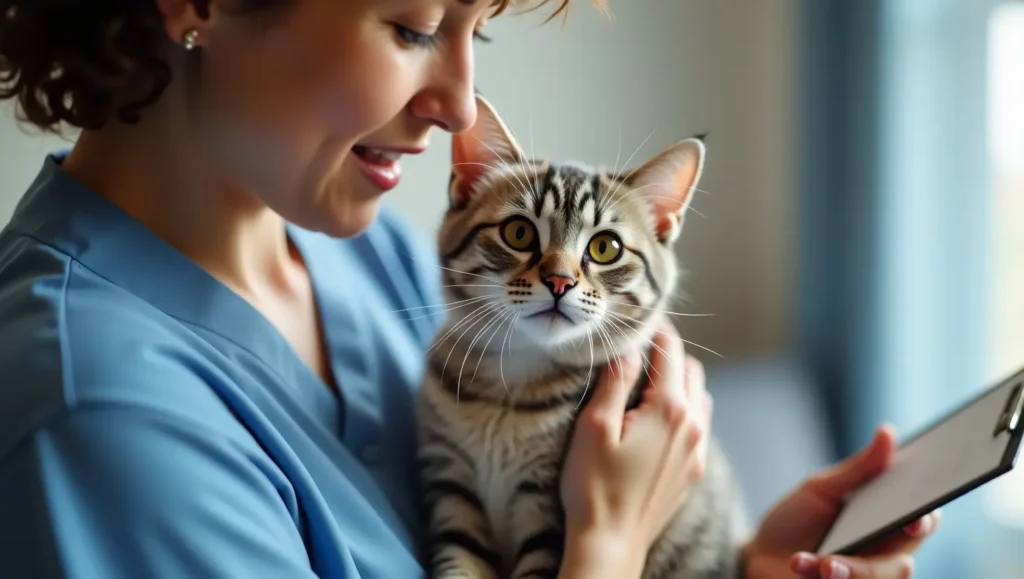At WhizPet, we understand how much you care about your feline friend. That’s why we conducted in-depth research to answer one crucial question: can vestibular disease kill a cat? After reviewing expert veterinary insights, case studies, and real-life experiences, we’ve compiled the most important facts you need to know.
Can vestibular disease kill a cat? This condition, which affects balance and coordination, can be distressing for both cats and their owners. While it is rarely fatal on its own, the underlying causes—ranging from infections to neurological disorders—can pose serious health risks. Our research dives into the symptoms, causes, and treatments to help you better understand this condition.
So, can vestibular disease kill a cat? The answer depends on early detection and proper care. In this blog, we’ll explore the facts, debunk myths, and provide actionable insights to ensure your cat gets the best possible care.
Can Vestibular Disease Kill a Cat? Understanding the Risks
Vestibular disease affects a cat’s balance and coordination due to issues in the vestibular system, which includes the inner ear and brainstem. It can be caused by infections, toxins, or underlying health problems. While the condition itself is not always life-threatening, pet owners often worry: can vestibular disease kill a cat? The answer depends on the underlying cause and how quickly treatment is provided.
If left untreated, serious health issues such as brain inflammation, strokes, or chronic infections can worsen a cat’s condition. This raises an important concern—can vestibular disease kill a cat if not managed properly? Seeking veterinary care promptly can improve recovery chances and prevent life-threatening complications.

Fact 1: Can Vestibular Disease Kill a Cat?
In most cases, vestibular disease is not fatal, but the underlying cause can be serious. If left untreated, conditions like brain tumors, strokes, or severe infections can lead to complications that may shorten a cat’s lifespan. However, prompt diagnosis and treatment can significantly improve a cat’s prognosis.
Many pet owners ask, can vestibular disease kill a cat if symptoms are ignored? While the disease itself may not be directly fatal, ignoring persistent symptoms can lead to deterioration in your cat’s health. Immediate veterinary attention can help rule out life-threatening conditions and provide effective treatment. Early intervention ensures better chances of recovery and helps maintain your cat’s quality of life.
What Causes Vestibular Disease in Cats?
There are multiple potential causes of feline vestibular disease, some of which can be life-threatening if not addressed promptly. Pet owners often wonder, can vestibular disease kill a cat if the root cause is severe? The answer depends on early diagnosis and treatment.
- Ear Infections – Inner ear infections caused by bacteria or fungi can interfere with balance.
- Toxins – What toxins cause vestibular disease in cats? Common culprits include household cleaners, pesticides, and certain medications.
- Neurological Disorders – Conditions like brain tumors, strokes, or head trauma can cause lasting damage.
- Idiopathic Vestibular Disease – This sudden-onset condition has no known cause but typically improves within weeks.
If left untreated, can vestibular disease kill a cat? While the condition itself is rarely fatal, ignoring the symptoms could lead to serious complications. Seeking veterinary care ensures the best possible outcome for your pet.
Fact 2: Is Vestibular Disease in Cats Painful?
Most cases of vestibular disease are not painful, but they can be unsettling for cats. Symptoms like nausea, dizziness, and loss of balance may cause distress, leading to reduced appetite or reluctance to move. Some cats may appear disoriented or anxious due to their sudden lack of coordination.
Pet owners often ask, can vestibular disease kill a cat if their feline seems severely affected? While the condition itself is not usually fatal, complications from underlying issues or injury due to imbalance can be concerning. Providing a calm, supportive environment and seeking veterinary care can help ensure a smooth recovery.
Signs and Symptoms: Can Vestibular Disease Kill a Cat if Left Untreated?
Recognizing symptoms early can help you seek timely treatment. Common signs include:
- Head tilt
- Loss of balance
- Circling or falling
- Rapid eye movements (nystagmus)
- Nausea or vomiting
Fact 3: Do Cats with Vestibular Disease Sleep a Lot?
Yes, cats with vestibular disease may sleep more than usual due to dizziness, nausea, and overall disorientation. Rest plays a crucial role in their recovery, as excessive movement can worsen their imbalance and increase the risk of falls.
Many pet owners worry, can vestibular disease kill a cat if their feline becomes too lethargic? While increased sleep is a normal response, extreme weakness or refusal to eat may indicate a more serious issue. Monitoring your cat’s behavior and consulting a vet can help ensure a smooth recovery.
Treatment for Vestibular Disease in Cats
The treatment depends on the cause:
- Ear infections – Antibiotics for vestibular disease in cats can clear up bacterial infections.
- Toxin exposure – Immediate removal of the toxin and supportive care.
- Idiopathic cases – Symptoms often resolve in 2-3 weeks with proper care.
- Neurological conditions – Advanced treatments may be required, including surgery or long-term management.
Fact 4: Can Vestibular Disease Kill a Cat Without Treatment?
Yes, if the underlying cause is severe—such as a brain tumor, stroke, or untreated infection—it can be life-threatening. Without prompt veterinary care, symptoms may worsen, leading to permanent neurological damage or complications affecting a cat’s overall health.
Pet owners often ask, can vestibular disease kill a cat if left untreated? While idiopathic cases may resolve on their own, serious conditions require immediate medical attention. Seeking early diagnosis and treatment increases the chances of recovery and prevents potential fatal outcomes.
Fact 5: Can Vestibular Disease Be Treated at Home?
Yes, home care plays a vital role in recovery. If you’re wondering about a home remedy for vestibular disease in cats, consider the following:
- Keep your cat in a quiet, padded space to prevent falls.
- Use shallow food and water dishes for easy access.
- Ensure proper hydration and nutrition to support healing.
When to See a Veterinarian
While some cases resolve naturally, visit a vet if your cat:
- Shows severe or prolonged symptoms.
- Stops eating or drinking.
- Develops worsening neurological signs.
Can Vestibular Disease Kill a Cat? Here’s What You Need to Know
Pet owners often ask, can vestibular disease kill a cat if left untreated? While the condition itself is rarely fatal, underlying causes like infections or tumors can be life-threatening. Additionally, recurrence is possible if the root issue is not addressed. Regular vet check-ups help monitor your cat’s health and prevent future complications.

Most Asked Questions About Vestibular Disease in Cats
1. Can vestibular disease kill a cat at home?
If caused by a serious condition like a stroke or tumor, it can be life-threatening. However, idiopathic vestibular disease is usually not fatal and improves over time.
2. What are the best antibiotics for vestibular disease in cats?
If a bacterial infection is the cause, vets may prescribe amoxicillin, enrofloxacin, or clindamycin, depending on the specific infection.
3. How long does it take for a cat to recover from vestibular disease?
Recovery typically takes 2 to 3 weeks, but some cases may take longer depending on the cause.
4. Can stress cause vestibular disease in cats?
Stress alone does not cause vestibular disease, but it can exacerbate symptoms in cats with underlying health issues.
5. Should I put my cat down if it has vestibular disease?
Euthanasia is not necessary in most cases. With proper care, many cats recover fully.
Final Thoughts: Can Vestibular Disease Kill a Cat?
While vestibular disease itself is not usually fatal, serious underlying causes can be life-threatening. If your cat shows symptoms, seeking veterinary care promptly can make a significant difference in their recovery.
Take Action Now!
Can vestibular disease kill a cat? If you’re concerned about your pet’s health, consult a vet immediately! Early intervention ensures a better prognosis. Share this blog with other cat owners to spread awareness!
Related blog: For more detailed information about pet care

